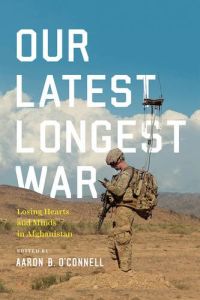Join getAbstract to access the summary!

Join getAbstract to access the summary!
Aaron B. O'Connell
Our Latest Longest War
Losing Hearts and Minds in Afghanistan
University of Chicago Press, 2017
What's inside?
How has the US military spent billions and still not won the war in Afghanistan? Blame the culture gap.
Recommendation
When foreigners take issue with American exceptionalism, folks in the United States tend to tune out. But when a group of uniformed US officers makes the same argument, it’s hard to ignore. That’s the case with this collection of critiques of the US effort in Afghanistan, edited by Marine Corps Lt. Col. Aaron O’Connell and written by American officers who served there. These essays underscore why huge cultural differences between Afghans and Americans have made the goal of establishing a liberal democracy in Afghanistan all but impossible. The authors argue politicians and military leaders have a huge blind spot when it comes to the idea that US-style democracy is the best system in the world – one that all people will embrace, given half a chance. In fact, even after the Americans routed the Taliban, Afghans weren’t keen to trade in their centuries-old traditions. The essayists achieve a difficult task: coolly and unemotionally spelling out the folly of American policy and execution. This collection should be required reading for the next policymaker who sets out on a program of nation building.
Summary
About the Author
Aaron B. O’Connell is a lieutenant colonel in the US Marine Corps Reserve and served in Afghanistan from 2010 to 2011. He holds a doctorate in history from Yale University and is the author of Underdogs: The Making of the Modern Marine Corps.
















Comment on this summary